#Text Analysis
Text
Frankenstein defeats Dracula
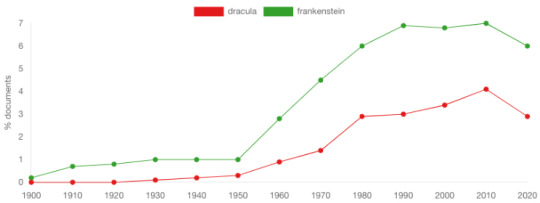
So, ITHAKA (JSTOR's parent nonprofit org) now has a new service called Constellate, and in it you can do data analysis, among other things.
Not wanting to do what we're really supposed to be doing right now, we thought we'd check out how Dracula performed against Frankenstein, and to our surprise, the monster gets A LOT more mentions in scholarly literature than our Transylvanian Count.
Y'all are a smart bunch, so feel free to do something less frivolous (or at least more interesting) at Constellate.org. All you need to get started is your free JSTOR login (or you can create one if you haven't yet).
448 notes
·
View notes
Text
HELLO AGAIN, SUKUNA ENJOYERS !! remember almost a month ago, i posted about part 1 of a friend’s sukuna lost in translation analysis ?
she just finished and posted a part 2 !! for those who have been waiting for it, it’s here now ! there’s no “lost in translation” in this one, mainly an analysis going deeper into sukuna’s character which i think many will enjoy .
again, user is @/societyhater_ !!
some images below so people have an idea of how it’s structured. link to the full version will be after the selected images so please read the whole thing if you are interested!
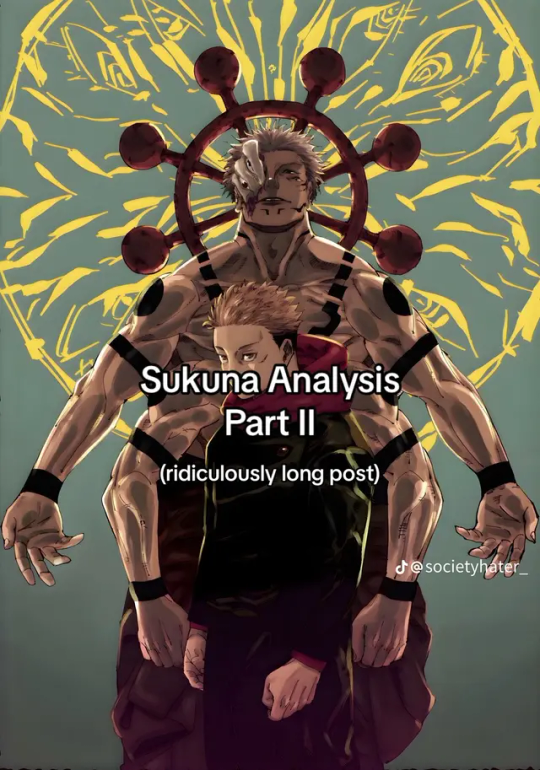
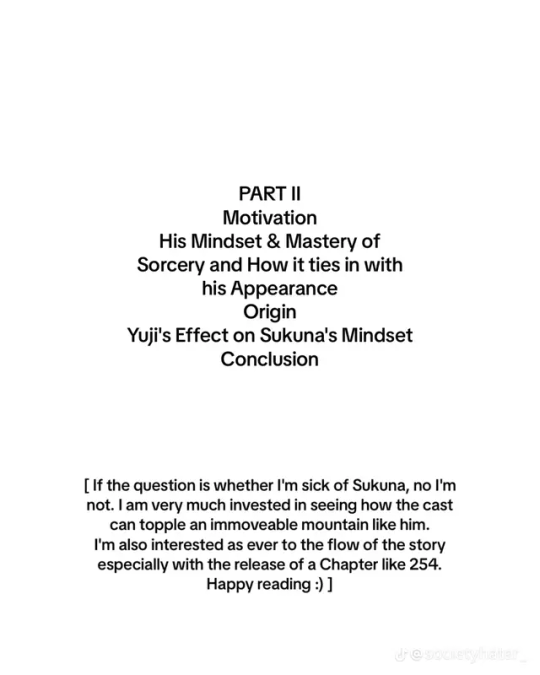
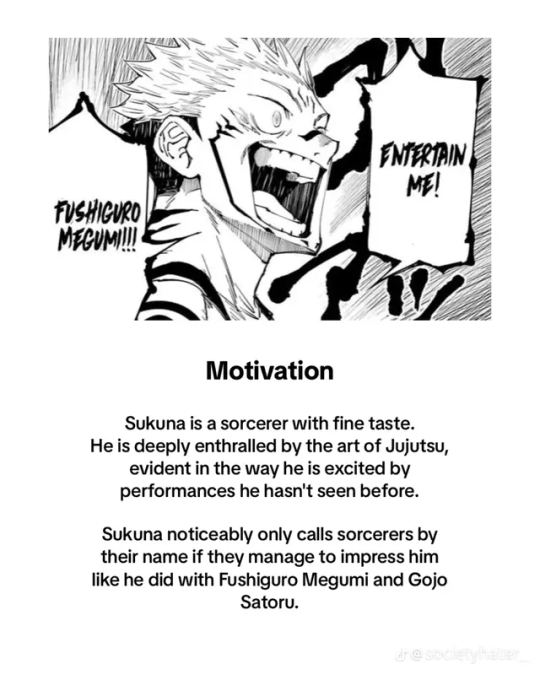
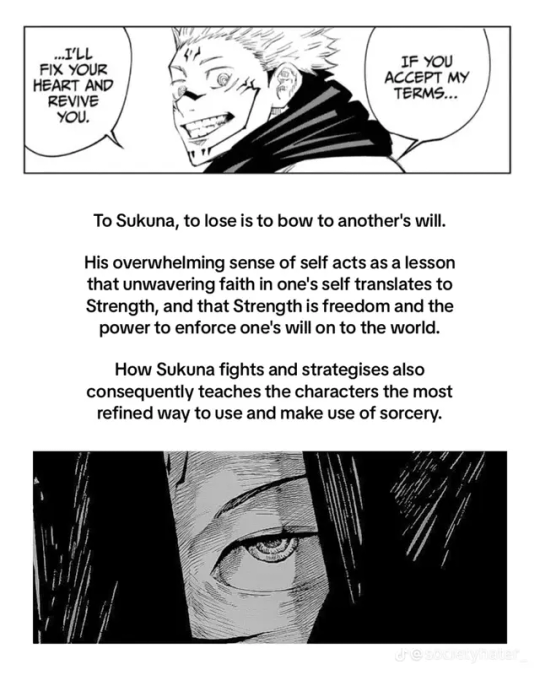

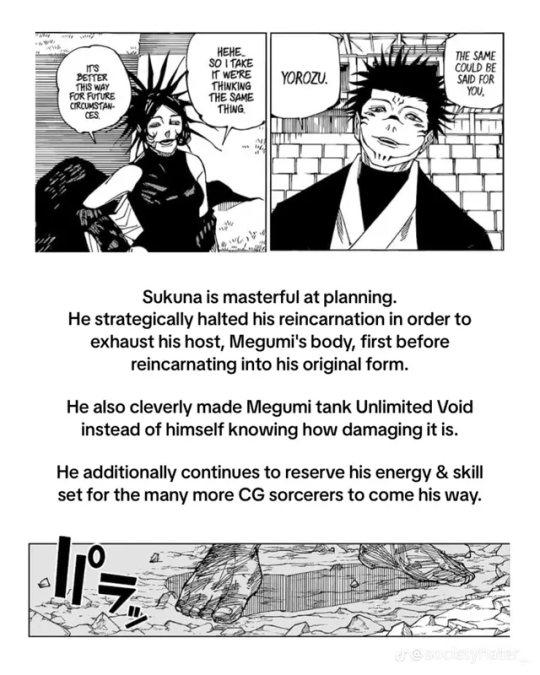


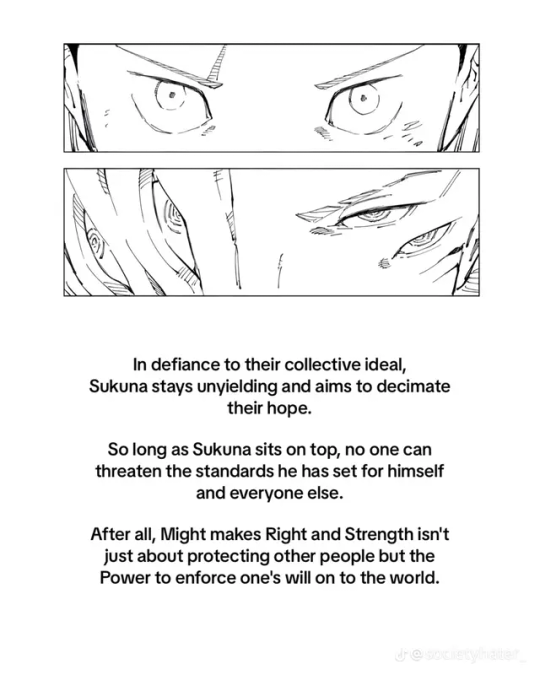
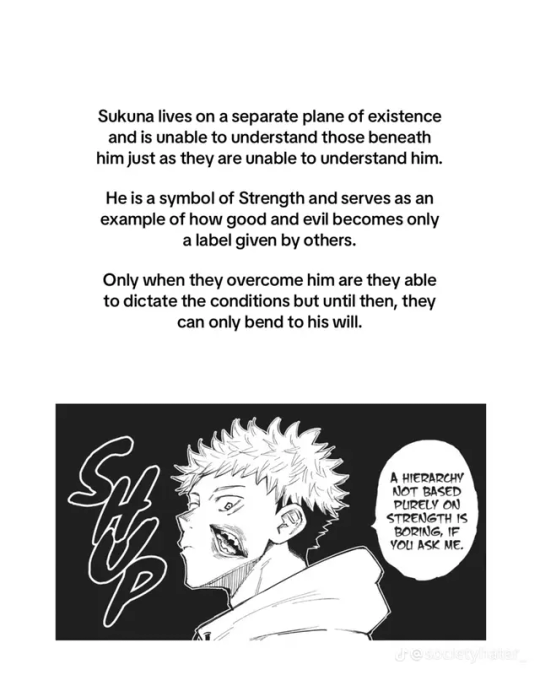
#part 2 of the suku analysis !!#again i recommend checking out her other posts too :]#another banger ueheuehe#jujutsu kaisen#jjk#sukuna#ryomen sukuna#manga analysis#text analysis#character analysis
27 notes
·
View notes
Text
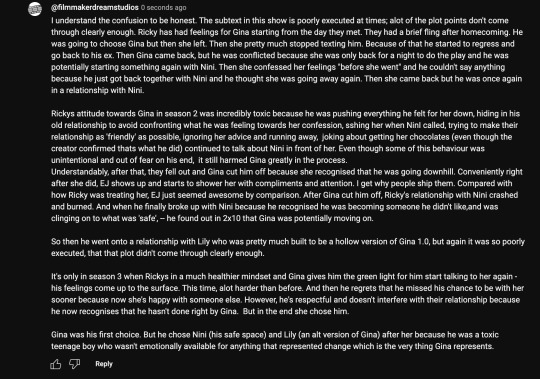
#'regardless of whats happens in the main plot the subtext has always been their love story'#rina#ricky x gina#high school musical the series#tv show#hsmtmts#gina x ricky#subtext#analysis#high school musical the musical the series#ricky bowen#gina porter#sofia wylie#joshua bassett#disney#disney +#hsm the series#youtube comments#reply#text analysis#for a straight couple their storyline is queercoded as hell#coding#high school musical#hsmtmts season 4#hsmtmts season 3#rina week 2023#hsmtmts season 2#hsmtmts season 1
45 notes
·
View notes
Text
so much (for) stardust is literally the album of a generation. it perfectly encapsulates the widespread mindset among millennials & gen z post-Covid.
“the shell’s empty, there’s no point to any of this, it’s all just a, A random lottery of meaningless tragedy and a series of near escapes”
“I’d never go, I just want to be invited”
“we’re told we gotta get ahead, yeah, no matter what it takes / but there’s no way off the hamster wheel on this rat race”
but the album isn’t just nihilism, either. it’s perfectly summed up once more in The Pink Seashell, “so I take pleasure in the detail.”
“the view’s so pretty from the deck of a sinking ship.”
“feeling so good right now, til we crash and burn somehow”
“they don’t know how much they’ll miss, at least until you’re gone like this”
in this album fall out boy is saying “hey, it sucks. we know this, we hear you, we feel the same, but there are still things to enjoy, still love to make. the only purpose in your life is what you give it, and that’s okay.”
#I have been thinking this non stop since it was released#pls be gentle I haven’t done one of these since my intro to writing class#this is just like my opinion man#text analysis#media analysis#music analysis#fall out boy#so much (for) stardust#pete wentz#patrick stump#andy hurley#joe trohman#smfs#sm(f)s#fob#fall out boy so much (for) stardust#millennials#gen z#mine#arwyd#op#ethan hawke#the pink seashell#heaven iowa#love from the other side#so good right now#what a time to be alive#100#literary analysis
147 notes
·
View notes
Text
Azi’s Zim is Disabled Essay
So there are a lot of different interpretations about Zim being defective that exist. There are a lot of interpretations about what it means to be defective in the first place. I would like to propose that being defective, not only relates to neurodivergence and “non-desirable” behavior (anything that goes against the Irken regime) but also certain physical disabilities, in specific chronic illnesses.
I would like to draw a line here because I firmly believe that the Irken Empire would not give a shit about limb differences. They are technologically advanced (even if their technology is mostly stolen from other species) so, to them, it would be entirely cosmetic and one could simply get cybernetics. However, a problem with the body’s systems cannot be as easily addressed. Thus, Irkens with conditions, like these would be considered defective. Due to their condition, they cannot contribute in the same way as others if they can contribute at all. They would be considered a liability. That’s right, the space fascists are probably also eugenicists (shocking no one). I mean seriously, that’s pretty easy to see. They literally genetically engineer their own people to near perfection.
The only way for a genetic issue like this to happen with the way smeets are made would be because of some kind of cloning error. Anyone reading this probably knows that a popular headcanon about Zim is that he is the product of some kind of cloning error. This is a headcanon that I agree with. So, if Zim is the product of a cloning error what saying that he doesn’t have some kind of invisible disability like a chronic illness.
Putting the lore side, when you look at the Irken Empire, as a satirical representation of America, its greed, its disregard for citizens, and its imperialism, having Zim be disabled makes thematic sense. Zim is actively disregarded by and pushed out of Irken society, many people tend to interpret this as Zim being autistic or another neurodivergent parallel, which I agree with. However, why not take this a step further, why not make a Zim physically disabled?
The closest thing within fandom spaces that I’ve seen to interpreting Zim as disabled, is making Zim autistic or deaf/hard of hearing. However, when this is written it usually has little to no bearing on the plot of whatever is being written. It is almost always a superficial detail of some kind like the occasional mention of Zim having a hard time hearing something, not understanding subtext, or wearing a hearing aid.
I don’t think this is a problem within the Invader Zim fandom; I am well aware that there is just not much fic about disabled characters in which they are actively discussed as being disabled or their disability is important to the plot in some way. I am not blaming anyone for this issue, it’s just the fact that not many people write disabled characters. I think this problem mostly comes from the fact that people are scared of messing it up. Quick message: if you think that you have a good writing idea that involves a disabled character, make sure you do your research, but fucking write it! Even if they aren’t anywhere close to implied to being disabled in canon. What is the point of fanfiction if not to give fans the space to interpret the character however they please?
Apologies for the tangent but it was important. I’m going to shift the topic a bit, onto examining a symptom of chronic illness that I see in Zim within the canon. Specifically, I think that it explains one of the main inconsistencies in Zim’s character.
Many people including myself have noticed the fact that Zim is simultaneously very smart, but also very incompetent at times. This seems to be a contradiction because someone as smart as he is shown to be, logically, shouldn’t be making some of the mistakes that he does within the canon. And I have a plausible solution to this: brain fog. Brain fog is an overarching name for a collection of symptoms that includes an inability to focus and concentrate, confusion, unusually inhibited logic skills, feeling disoriented, as well as trouble remembering and comprehending information. If Zim was intermittently experiencing these symptoms, the inconsistency of him being simultaneously a genius and on many occasions almost completely incompetent would be explained. Brain fog is a symptom of a lot of different things, personally, I interpret it as chronic pain and immunodeficiency for my Zim headcanons and my AU.
Being able to deep dive into Fem Zim’s experience with her disability as she continues her story is important to me. Describing her chronic pain is important to me. Not having a fix for her condition is important to me. Having a character that is not just disabled, but who talks about their disability, has prose dedicated to their symptoms, and has it as an important part of their character building and development is something that I do not see. Let alone anyone with a similar condition to me. Zim is that character for me, whether it’s me going into specifics about Fem Zim’s symptoms within my own AU, or me as a kid, first getting into Invader Zim, and seeing so much of myself in Zim as a character.
You can interpret Zim however you want, I’m not telling you what to do. But I would like to point out that this is an entirely underutilized interpretation that in a fandom that has existed for over 20 years know I do not know of any other genuine instance of.
My only explanation for that is that y'all are cowards. /j
#I'm sorry if this sounds aggressive at all#I've been told that my writing style in essays can come off as aggressive because I speak confidently when writing persuasively#and I guess that's intimidating.#I'm also tired#if this is what I’m going to write like in college than the professors at UPenn better get fucking ready#homestead homestuck housewife#galaxy girls iz#invader zim au#invader zim fanfiction#invader zim#invader zim zim#fem zim#character analysis#text analysis
28 notes
·
View notes
Text
ok so i feel like im the only tma guy EVER who is always likening jon to laura palmer right. this is my one unique experience
but i NEED to make a web weaving post about it at some point and im gonna start by talking about the first thing that comes to mind:
the choice laura imposes on herself to either live on while "possessed" by BOB (possessed in brackets bc while this happens in the text of the show its like. its Such a metaphor its not even funny anymore) or let him kill her about it so she wont have to hurt more people the way BOB hurt her.
VS.
jon, after basically dying in the unknowing, being given the choice (by oliver from the end) to come back after his coma or not. but while jon Does make the decision to wake up (because its not the end of the podcast and because he hasnt lost Everything yet so hes gotta have hope, which is nice at least) i feel like his struggles with the decision are similar to laura's.
by virtue of being made an eye avatar in the way that he became, hes constantly hurting people by feeding off of their traumas right. its similar to how, less metaphorically paranormal, laura is a girl with issues (understatement🙄) who cant seem to live in a way that Doesnt project these struggles on others. i keep calling the two metaphors for the cycle of abuse but like, gonna be real, i think the cycle of abuse is an existing psychological term that doesnt mean what i thought it means. im talking about a metaphor for how being brought up in a shit situation will have u subconsciously act the same towards your own environment. shown in jon being manipulated into being an eye avatar etc and now making people re-experience their traumas. or laura suffering her fathers abuse and taking her pain out on others to feel a sense of control. it JUST makes sense!!!!!
#tma#tp#twin peaks#the magnus archives#laura palmer#jon archivist#jon sims#this is so important to me. as a kinnie and a man with psychological problems#text analysis#love tagging fandom bullshit as text analysis#GONNA make a web weaving post i promide
28 notes
·
View notes
Text
1984: My Analysis
🗺🖥☭👁☭🖥🗺
So this was an English project for school but I thought I would post it on here for shits and giggles because I think it's kinda hopefully good? Just know that it was a presentation assignment not an essay to the structuring is different. Feedback is welcome even though nobody is going to see this :D!
🗺🖥☭👁☭🖥🗺

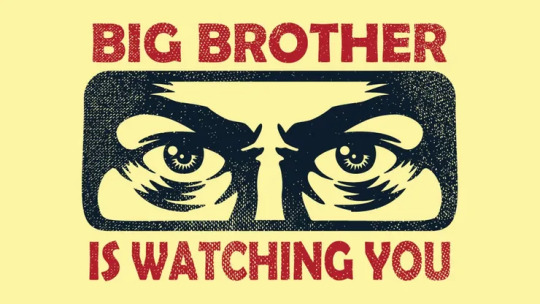

Script
Today we are exploring George Orwell’s dystopian novel, 1984.
Imagine a world where every step you take is monitored, every word you utter is scrutinized, and every thought you harbor is policed. This is the reality that Orwell depicts with the statement "He was a lonely ghost muttering a truth nobody would ever hear," and opening line used to eco the isolation that characters are subjected to. Via this we are plunged into a realm where isolation and totalitarianism reign with no counter. By dissect this chilling reality and exploring how Orwell uses his narrative to shine a light on the insidious nature of authoritarianism and it’s effects on the human psyche.
Our exploration will revolve around answering the question; how does society based on religious oppression and totalitarianism as a means to prevent collective understanding and cohesion inflict alienation and isolation as a tool to maintain this regime and how are the subjects to these methods affected? To that I say, the government, through religious oppression and totalitarianism, inflicts alienation and isolation upon its subjects as a means to maintain control and prevent collective understanding and cohesion.
Firstly, to unravel the semantic field of isolation and loneliness present through out. Orwell paints a image of solitude as he wrote, "He felt as though he were wandering in the forest of the sea bottom, lost in a monstrous world where he himself was the monster." Encapsulating the bottomless sense of emptiness and despair via the archetype of forest being unknown wonderous places, with the description of being underwater gives us as readers the sense of suffocation, all encapsulated with the reflection of ones self being distorted as a portrait of the imposter syndrome the Oceania citizens face. This loneliness faced by Winston serves as a poignant reminder of ones mentality under an oppressive regime.
Contextualizing this theme within the setting, comprehending the Parties fervent surveillance tactics is a necessary element. The oppression of the people is symbolized by the telescreens, the is conveyed as Winston and Julia are visiting O'Brien and he describes the room as, "long-shaped and softly lit. The telescreen on a low murmur; the richness of the dark-blue carpet gave one the impression of treading on velvet." The usage of long-shaped illudes the reader into a sense of restriction, as a narrow space is implied. This spatial confinement depicted illustrates the constriction of freedom that the characters are experiencing, despite maintaining that they are joining the Brotherhood. The ‘low murmur’ is used to exhibits the constant feeling of being scrutinized by the Party, coupled with the sensory trigger of dark rich velvet used as a evoking of luxury and given the context, used to highlight the artificiality of the environment as this luxury is used in stark contrast to the Party’s run down building. This passage further emphasizes the toll of living in a world devoid of genuine human connection, privacy, and autonomy.
Expanding our analysis beyond the confines of 1984, in Suzanne Collins prequel to the Hunger Games, a true reflection of the isolation faced by subjects to dystopian rule is encountered, "Try not to look down on people who had to choose between death and disgrace." This passage sheds light on the harrowing choices faced by individuals living under oppressive regimes, where isolation and persecution are wielded as weapons of control. Through this lens a deeper understanding of Oceania is acquired as it prompts readers to reflect on the ethical complexities inherent in totalitarian societies, fostering a deeper understanding of the themes of power, control, and resistance depicted in 1984.
Turning our gaze towards the insidious nexus of religion and totalitarianism, we confront the Party's relentless crusade against individual thought and autonomy via the elimination of diversity of thought especially in a religious context. This is done so that Big Brother, the symbolism of the party, is the only idol worshipped and power is centralized and fixed.
We confronted by the Party's relentless crusade against individual thought and autonomy in the haunting proclamation, "If you want a picture of the future, imagine a boot stamping on a human face - forever." Orwell captures the essence of the danger of a hivemind and a lack of ideological variance. The imagery of a boot is symbolizing the absolute dominance and power held by the Party over the individual, crippling any semblance of freedom. By instilling fear and enforcing doctrine into citizens, the regime aims to eliminate any collective understanding or cohesion that may arise from religious beliefs as the Party forces any practices not aligned with it’s agenda into submission.
We further uncover the Party's cunning manipulation of reality and truth by delving deeper into the relationship between religion and authoritarianism. Orwell poses the disquieting question, "After all, how do we know that two and two make four?," in a way that subtly questions our understanding of reality. Through this rhetorical interrogation, Orwell reveals the weakness of truth in a society where reality is manipulated and distorted through this rhetorical inquiry.
We come across an external quotation that clarifies the theme of Orwell's investigation and speaks to the widespread power of totalitarian governments. The source highlights the loss of personal autonomy and agency in the face of repressive governments, stating that "the nature of being human and possessing identity is under attack." It alludes to the negative consequences of societal fragmentation and the restoration of a sense of social cohesiveness, which can be achieved by promoting a sense of community, shared purpose, and active participation. This outsider's viewpoint highlights the general applicability of Orwell's warning story by providing a fascinating parallel to his story.
As the journey approaches an end, let's consider the important insights acquired while studying tyranny and isolation in 1984. We have been exposed to the harsh realities of oppression and control through Orwell's narrative, where the human spirit is put to the test against the powers of dictatorship and manipulation. Let us acknowledge, in closing, the ongoing importance of Orwell's writing in questioning the current quo and motivating us to defend the values of truth, freedom, and personal autonomy in the face of difficulty. Thank you.
#1984#analysis#George Orwell#orwell 1984#literary analysis#literature#english#speech#school assignment#text analysis#dystopia#religion#totalitarianism#big brother#hunger games#presentation#humanity#isolation#lonliness
2 notes
·
View notes
Note
What is your essay about?🤓✨
im SO glad you asked!
its for my film genre class, how genre is emphatically tied to the culture and morals of the time the text was made
the two films im discussing are Akira (1988) and Perfect Blue (1997). for akira ill be going into japans economic boom and bubble economy in the eighties and the wealth disparity, poverty, and urban loneliness that came with it that was felt by japanese citizens long before the recession happened, and how it influenced akira as a foundational cyberpunk film and has since become a cyberpunk staple
for perfect blue ill be discussing the introduction of home internet access and peoples fears regarding distinguishing the virtual vs reality, and how it was an avenue exploited to destroy the barrier between mimas public and private life, and how that coincides with the shift in the idol image in the nineties from untouchable to accessible and how this was all mixed into one big soup via todorovs concept of the fantastic to make one hella scary movie
#thanks SO much for askin bro i will take any chance to talk about this shit#i love film theory. i love textual analysis#film theory#akira 1988#perfect blue (1997)#text analysis#film analysis#nerdy shit#essay writing#lee posts#ask#ask response
26 notes
·
View notes
Text
OK, wow do I want to talk about all the bible verses Tamsyn uses in her John chapters! But, first a disclaimer: I’m Jewish and have a pretty solid background in TaNaKh and Jewish textual criticism but basically none in Christian/second testament textual criticism. Despite my lack of knowledge in the second testament, I went through and collected each of the bible verses for each of John’s excerpts - along with in some cases relevant following lines - because I just... had to know.
Part of my fascination here is that in many of these verses, John’s experience parallels elements of Jesus’. But, the biblical John is a disciple, not a messiah-figure like Jesus. John blurs the lines between Earth’s disciple, and “god” figure himself. The blurring of the lines in Tamsyn’s verse choices are also particularly interesting following her most recent interview where she said she’s got like six christ characters all running around. Everyone is a christ figure - and they all do it differently. Even the characters that are supposed to just be a disciple find themselves trying to play at a christ or a divine story line. Anyways, what follows is all of the verses and some of my loose and chaotic thoughts. Curious what others are noticing. All translations are from the New International Version and compiled using Blue Letter Bible.
John 20:8 “Finally the other disciple, who had reached the tomb first, also went inside. He saw and believed.”
Okay when I first opened the book and obviously googled this right away I got CHILLS. We open with a reference to reaching the tomb and believing. This both feels like it’s in reference to everyone seeing the Earth as a tomb and believing. As well as, of course, everyone who at the end of the book, will go to the tomb and believe. She begins, as always, foreshadowing the end. And I find that infuriating and incredibly metal of her.
John 5:20 “For the Father loves the Son and shows him all he does. Yes, and he will show him even greater works than these, so that you will be amazed.”
“Most of the bodies got the melt, like we thought they would... But, Harrow... all the ones I touched, all the ones I loved... they stayed incorrupti” (NtN 76).
Fascinated by what is either a careful writing choice, or a sloppy copy error to leave out the period after “incorrupti”. It’s as if Tamsyn whispers back at the scripture to add an ominous open ending to the “amazed”.
John 15:23 “Whoever hates me hates my Father as well.” And continuing to the next two lines “If I had not done among them the works no one else did, they would not be guilty of sin. As it is, they have seen, and yet they have hated both me and my Father. But this is to fulfill what is written in their Law: ‘They hated me without reason.’”
I’m still sitting with this reference. This is the chapter where U-- And T-- are renamed and John moves them from across the room. “If I had not done among them the words no one else did” feels tied here. John’s growing sense of self righteousness continues as he becomes more fanatic... curious what other’s think. It’s a juicy line and an intense chapter.
John 5:18 “For this reason they tried all the more to kill him; not only was he breaking the Sabbath, but he was even calling God his own Father, making himself equal with God.”
This is the chapter where they stream John’s necromancy. His journey towards presenting himself publicly as a “god” begins in earnest.
John 8:1 “but Jesus went to the Mount of Olives.”
This is the story that even I’ve heard about where a woman is brought before Jesus and accused of adultery while he is sitting at the courts and he says “let those who are without sin cast the first stone”. John is beginning to present himself as a savior - people come to see him for their sufferings and their problems. John moves further into the public sphere.
John 19:18 “There they crucified him, and with him two others—one on each side and Jesus in the middle.”
“Anyway, we all had Interpol warrens... Anyone who wanted to go, I let them go (NtN, 220).” This is also where it becomes clear just how bad the situation is - the rich are leaving the Earth to be crucified. The lines are blurry between who is being crucified and is it the disciple, the executioner, or the divine being telling the story.
John 5:1 “Some time later, Jesus went up to Jerusalem for one of the Jewish festivals.” Followed by 5:2 “Now there is in Jerusalem near the Sheep Gate a pool, which in Aramaic is called Bethesda and which is surrounded by five covered colonnades.”
Tamsyn also mentioned Bethesda in her article, and earlier on John does seem to get into a kind of faith healing. But the chapter this verse titles is when John begins playing puppet master to a dead world leader in exchange for money and nuclear weapons. This feels like such a sinister perversion of the healing waters of Bethesda, and in many ways this chapter feels like the beginning of the end.
John 3:20 “Everyone who does evil hates the light, and will not come into the light for fear that their deeds will be exposed.” 3:21 continues “But whoever lives by the truth comes into the light, so that it may be seen plainly that what they have done has been done in the sight of God.”
OOF. What a fuckin’ verse to pair with John going full necromancer while he’s nursing a nuke under his floorboards. WHOABOY.
John 9:22 “His parents said this because they were afraid of the Jewish leaders, who already had decided that anyone who acknowledged that Jesus was the Messiah would be put out of the synagogue.”
John does (his first?) mass murder. This is the moment of trial to his disciples. They are not thrown out, John manipulates them, and they stay.
John 1:20 “He did not fail to confess, but confessed freely, “I am not the Messiah.” … And a few lines following in John 1:23 “John replied in the words of Isaiah the prophet, “I am the voice of one calling in the wilderness, ‘Make straight the way for the Lord.’ ”
“I am not the messiah” titles the chapter where the bombs go off. The world is demolished - there is no going back. “I am the voice of the one calling in the wilderness, ‘make straight the way for the Lord’”.
The line from Isaiah quoted in John reads, reads: ק֣וֹל קוֹרֵ֔א בַּמִּדְבָּ֕ר פַּנּ֖וּ דֶּ֣רֶךְ יי יַשְּׁרוּ֙ בָּעֲרָבָ֔ה מְסִלָּ֖ה לֵאלֹקינוּ׃ “A voice calls out in the desert ‘Clear a way for G!d, straighten out a pathway for our G!d through the wilderness” (My translation).
OOF.
John 5:4 From Blue Letter Bible: “Some Greek manuscripts exclude this verse. The NIV related footnote for 5:3 states:
Some manuscripts include here: “wholly or in part, paralyzed—and they waited for the moving of the waters. From time to time an angel of the Lord would come down and stir up the waters. The first one into the pool after each such disturbance would be cured of whatever disease they had.”
From time to time an angel of the Lord would come down and stir up the waters. Alecto awakes. I wonder what disturbances and diseases she will take it upon herself to cure?
#ntn#nona the ninth#nona the ninth spoilers#locked tomb meta#locked tomb spoilers#the way tamsyn uses religious texts is just wild#this is the most christian scripture i've ever read#and boy is it a wild ride#text analysis
34 notes
·
View notes
Text
I’ve been sick for awhile so my energy for writing book analyses has been kinda low, but I’m recovering now, which means I’m putting the first part of my HTTYD analysis out. This ones somewhat short - it just covers the intro of the first book. For readability, key themes and ideas will be written in bold.
- First of all, it’s been mentioned before by a few other metas, but this entire intro is one big heap of dramatic irony (I’m sure there’s a more specific term for this), in that it presents a conclusion before the story even starts. We can garner that A. This is a hero’s journey (”This is the story of becoming a hero the hard way”) and B. That the conclusion to this journey is not a complete victory (”for dragons are disappearing so fast they may soon become extinct”). Of course, the story itself regularly pretends that neither of these conclusions are true, which makes the second particularly bittersweet.
- We also get a glimpse at what dragons actually are. One thing to note is that whilst an example is given of smaller, less intimidating dragons (”Little, brown, scuttly dragons that hunted down the mice and rats in well-organised packs”), the overall vibe given is that dragons are very dangerous and scary creatures. This is also a somewhat misleading description - it presents dragons as animals to be trained, mentioning neither their intelligence or capacity for speech. On a first read through, a reader is probably going to think of these creatures (from this description) as more as an obstacle for Hiccup to overcome, getting them into the mindset of most of the Viking population.
22 notes
·
View notes
Text


I mean, I’ll take it
#I also got Mario Puzo and Oscar Wilde on the same wip#writing#original fiction#text analysis#just for fun#I guess my style is gothic
4 notes
·
View notes
Text
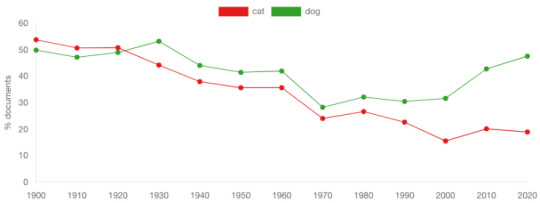
Yes, there are truly important things people do with text analysis, but we like to use it as kind of a competition. For example, we compared the number of mentions of "cat" vs "dog" in newspapers from 1900 to the present, and we were shocked to find out that cats were briefly in the lead up until about 1920, when it all started going downhill. Look at what happens in 2020!
You can run your own little competitions (or, you know, do some genuine research if you want) for free at https://constellate.org/builder.
Us, we're going to keep trying dumb competitions until the workday is over.

Image: A dog chasing a cat through a window. Etching by W. R. Smith after J. Pitman. From the Open: Wellcome Collection on JSTOR. Creative Commons: Attribution
162 notes
·
View notes
Text
Heavy sigh
Hallomann analysis because my friends didn't hear it enough let's go
(This song s ab rape and a pedo if you didn't know)
Let's go through the basics:
-she never talks, it's only him talking and the speech used is hyper simple, much more than Lindemann usually writes which makes it clear this is a) a young child and b) something the character is used to
-despite the rammstein brand, he never actually says anything graphic since the story is from her lense and she can't really process what's happening to her. It's all suggesting to like Wir bau'n was Schönes aus Haut und Sand.
-in the musical interlude there's a keyboard/guitar solo which sounds like a girl screaming (keyboard) and either a man yelling (as I interpret it) or as the act itself happening (my friend s take which is lovely) for the guitar
-despite the focus being put on his actions, any description that is offered is about her (consider Blondes Haar und Rosenkranz) and he remains nameless, as the title suggests
-phantom of the opera reference with Sing für mich, komm, sing which is a lovely touch given the power trip between Christine and Erik
Now for the fun part! I wanna draw your attention to a few things
-Perle auf dem Ring
-Sing für mich und dann /Auf den Wellen dein Gesang
And now! Let us consider the possibility that given the perle is referenced and not the diamond and her voice is lost on the waves, this could be similar to Aphrodite's/Venus' death! Or, furthermore, the goddess of beauty being associated with the girl's innocence and childhood which is now killed and lost of the waves, just as aphrodite was the perle born from the waves, the little girl is killed in the waves by a pearl that was her ending
All in all I want to eat Lindemann s brain this is so cool
6 notes
·
View notes
Text
SUKUNA ENJOYERS !!! READ PART 1 OF THE SUKU LOST IN TRANSLATION ANALYSIS MY FRIEND MADE NOWWWWW
it’s insightful and goes into detail while remaining simple and concise ! an enjoyable and digestible read !
user is @/societyhater_ !!
some images of said analysis below so people have an idea of how it’s structured. please read the whole thing if you are interested!
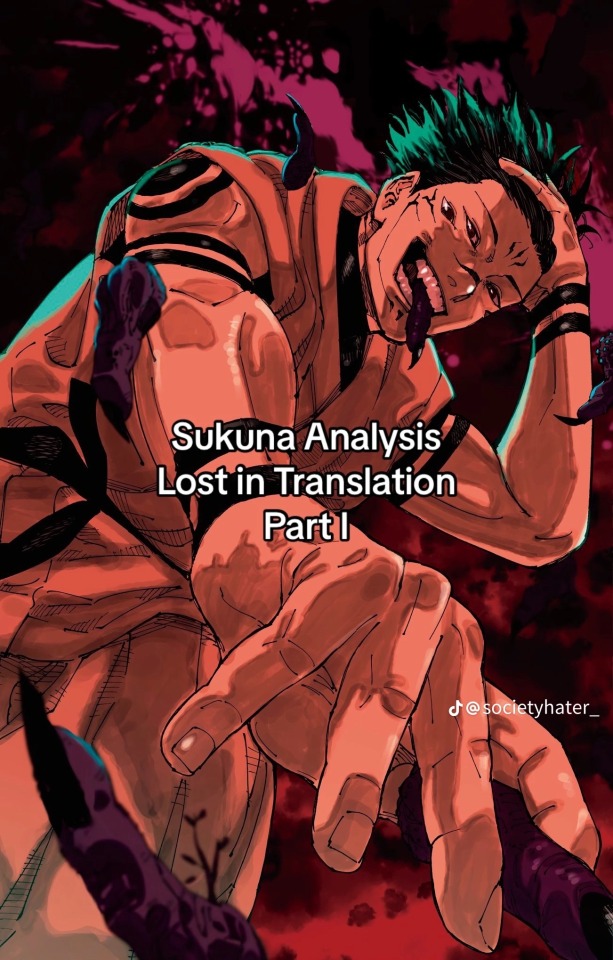
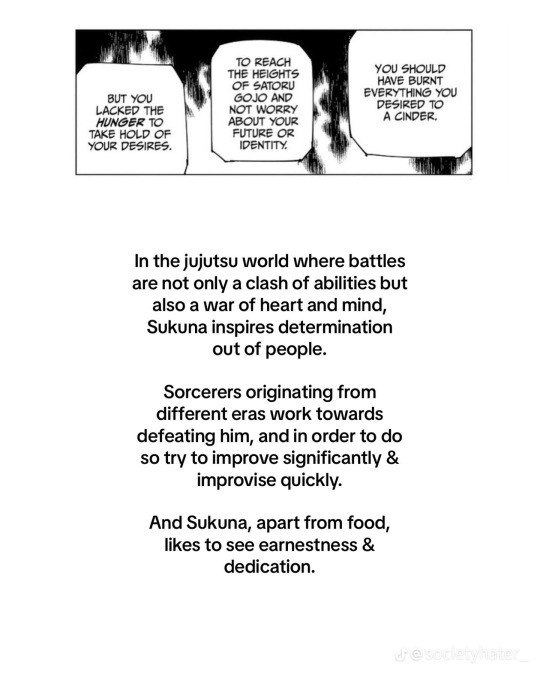
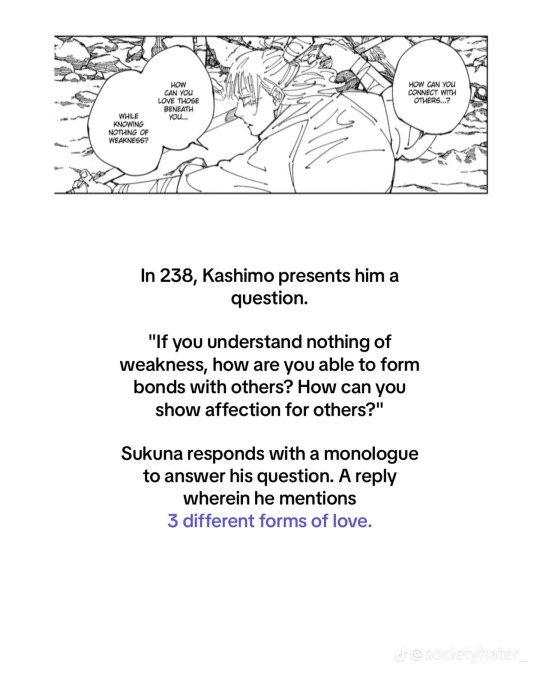
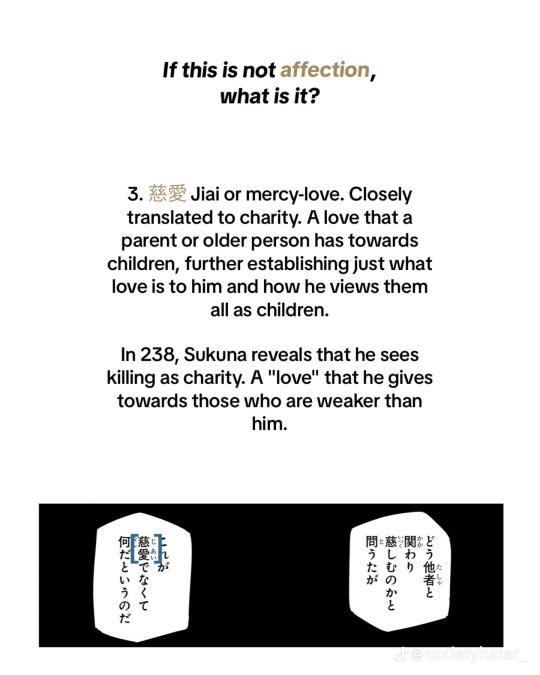

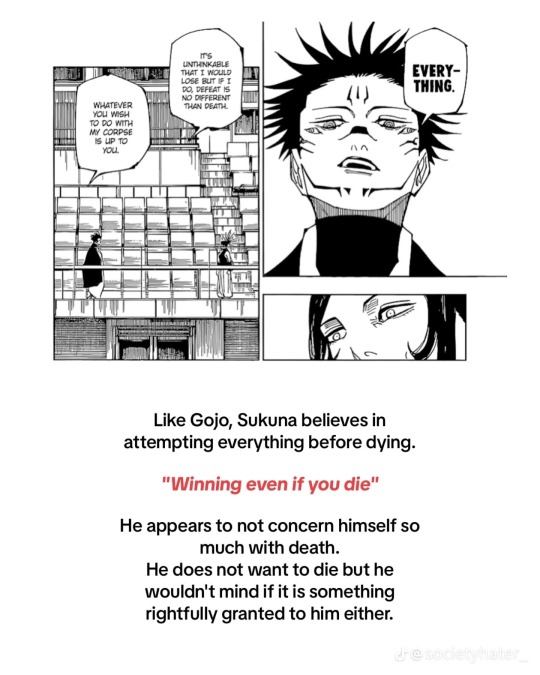
here’s where the full thing is!
#i HIGHLY recommend checking it out !!#her ‘lost in translation’ posts are actually how i ended up loving sukuna in the first place :0#i also recommend looking at her other posts as well 👍#jjk#jujutsu kaisen#sukuna#ryomen sukuna#lost in translation#manga analysis#text analysis#character analysis
47 notes
·
View notes
Text
Unlocking Insights from Your Documents: Exploring Google's NotebookLM
(Images made by author with Microsoft Copilot)
Previously static information sources, such as research papers and reports, are now brought to life by AI tools. These tools don’t just present data; they encourage us to actively delve into it, uncover hidden connections, and gain a deeper understanding. This is where Google’s NotebookLM stands out as a valuable tool for analyzing and extracting…
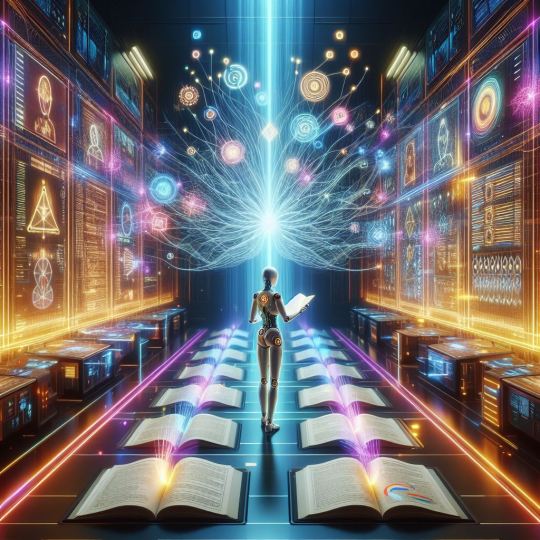
View On WordPress
#ai research assistant#ai research tools#content discovery#google ai#GoogleLabs#information extraction#NotebookLM#text analysis
0 notes
Text
Natural Language Processing Market by Component, Organization Size, Application, Sector (IT & Telecommunications, BFSI, Retail & E-commerce, and Healthcare & Life Sciences) - Global Forecast to 2030
#Natural Language Processing Market#natural language processing#nlp#nlp market#sentimentanalytics#text analysis#technology#innovation#information technology
0 notes